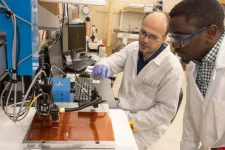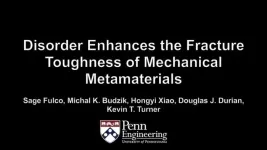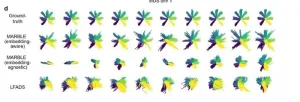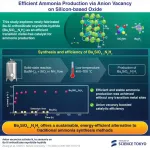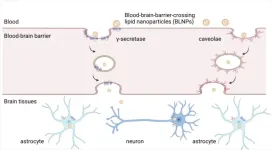(Press-News.org) Artificial intelligence (AI) can rapidly screen patients for clinical trial enrollment, according to a new study published in JAMA and led by Mass General Brigham researchers. Their novel AI-assisted patient screening tool significantly improved the speed of determining eligibility and enrollment in a heart failure clinical trial compared to manual screening. These findings suggest that using AI can be cheaper than conventional methods and speed up the research process, which could mean patients get earlier access to proven, effective treatments.
“Seeing this AI capability accelerate screening and trial enrollment this substantially in the context of a real-world randomized prospective trial is exciting,” said co-senior author Samuel (Sandy) Aronson, ALM, MA, executive director of IT and AI Solutions for Mass General Brigham Personalized Medicine and senior director of IT and AI Solutions for the Accelerator for Clinical Transformation. “We look forward to using this capability to assist as many trials as we can.”
The study randomized 4,476 patients to be either manually screened or screened using generative AI to see if they were eligible for the Co-Operative Program for Implementation of Optimal Therapy in Heart Failure (COPILOT-HF) trial.
In the AI arm of the study, a generative AI tool called RAG-Enabled Clinical Trial Infrastructure for Inclusion Exclusion Review (RECTIFIER) assessed clinical notes and other pieces of information in patients’ electronic health records to determine if they met key eligibility criteria for the heart failure study. Criteria included symptoms, chronic diseases, and current and past medications, among others. Study staff then conducted a short and rapid review of the patient charts that the AI-generated tool assessed as eligible for any outstanding issues with being considered.
In the other arm of the study, research staff manually reviewed patients’ charts to determine if they met the eligibility criteria.
Charts were screened by RECTIFIER or by the study staff over a set period of time. The AI-assisted screening process was far more efficient, screening 458 eligible patients compared to the 284 patients screened by study staff.
Following this process, patient navigators called patients deemed eligible to see if they would be willing to participate in the study. The navigators were not aware of whether the patients had been screened by the AI tool or a human, so as not to introduce bias. In the AI group, 35 patients enrolled in the trial, compared to 19 patients in the manual group.
“The rate of enrollment in the AI-enabled arm was almost double the rate of enrollment in the manual arm. This means that AI could almost halve the time it takes to complete enrollment in a trial,” said lead author Ozan Unlu, MD, a fellow in Clinical Informatics at Mass General Brigham and a fellow in Cardiovascular Medicine at Brigham and Women's Hospital.
Because previous research has shown that AI can introduce bias, the researchers conducted race, gender, and ethnicity analyses on patients who were enrolled via the manual screening process and those enrolled via AI-assisted screening. They found no significant differences.
The study follows an earlier “proof of concept” study by Blood, Aronson, Unlu and colleagues, which was published in June in NEJM AI. That study showed in a retrospective review of health records, that the RECTIFIER tool was slightly more accurate in identifying patient charts that met the heart failure trial’s eligibility criteria, compared to manual screening. This new research validates the tool to be highly effective in an active clinical setting.
“Our next goal is to expand the AI screening tool’s use outside of Mass General Brigham,” said co-senior author Alexander Blood, MD, MSc, a cardiologist at Brigham and Women’s Hospital and associate director of the Accelerator for Clinical Transformation at Mass General Brigham. “By adjusting the eligibility questions that the RECTIFIER tool asks of the medical record notes, AI screening can be applied to trials assessing cancer treatments, diabetes interventions, and many others.”
Authorship: In addition to Aronson, Blood, and Unlu, Mass General Brigham authors include Matthew Varugheese, Jiyeon Shin, Samantha M. Subramaniam, David Walter Jacques Stein, John J. St. Laurent, Charlotte J. Mailly, Marian J. McPartlin, Fei Wang, Michael F. Oates, Christopher P. Cannon, Benjamin M. Scirica, and Kavishwar B. Wagholikar.
Disclosures: Aronson reported receiving grants from Boehringer Ingelheim, Better Therapeutics, Foresite Labs, Milestone Pharmaceutical, Novo Nordisk, and Pfizer, personal fees from Nest Genomics and Harvard Medical School. Blood reported receiving grants from Boehringer Ingelheim, Better Therapeutics, Foresite Labs, Milestone Pharmaceutical, Novo Nordisk, Pfizer, General Electric Health, personal fees from Alnylam, Milestone Therapeutics, NODE Health, Walgreens Health, Medscape, Color Health, Corcept Therapeutics, Nference Inc, Withings, and Arsenal Capital Partners and having equity in Knownwell Health, Porter Health, and Signum Technologies. Unlu reported receiving funding from the National Heart, Lung, and Blood Institute (award T32HL007604).
Funding: This study was funded by the Accelerator for Clinical Transformation (ACT).
Paper cited: Unlu, O et al. “Manual versus AI-Assisted Clinical Trial Screening Using Large-Language Models (MAPS-LLM)” JAMA DOI: doi:10.1001/jama.2024.28047
For More Information:
Artificial Intelligence Accurately Screens Heart Failure Patients for Clinical Trial Eligibility | Mass General Brigham
Artificial Intelligence Research News | Mass General Brigham END
AI screening for heart failure clinical trial speeds up enrollment, study finds
Mass General Brigham researchers compared a generative AI clinical trial screening tool to manual screening and demonstrated that AI was significantly more efficient at screening and enrolling patients eligible for a heart failure clinical trial
2025-02-17
ELSE PRESS RELEASES FROM THIS DATE:
Accelerated drug-testing platform for ALS paves way for therapeutic innovation
2025-02-17
Amyotrophic lateral sclerosis (ALS) is a fatal neurodegenerative disease with few treatment options. Since 2018, the Sean M. Healey & AMG Center for ALS at Massachusetts General Hospital (MGH), a founding member of the Mass General Brigham healthcare system, has been working with national and international stakeholders to accelerate ALS research by launching the first platform trial in ALS to simultaneously test multiple drugs using shared trial infrastructure and placebo data. Findings from the first four drugs evaluated through the trial are published ...
Pancreatic cancer: blocked nerves as a possible new treatment strategy
2025-02-17
Pancreatic cancer is fueled by connections to the nervous system. This is reported by scientists from the German Cancer Research Center (DKFZ) and the Heidelberg Institute for Stem Cell Technology and Experimental Medicine (HI-STEM)* in their current publication in Nature. The team discovered that the tumor specifically reprograms the neurons for its own benefit. In mice, blocking nerve function inhibited cancer growth and increased the sensitivity of tumor cells to certain chemotherapies and immunotherapies.
For several years, ...
This research is absolutely nuts – for better health care
2025-02-17
A nut used in herbal tea has become a hydrogel perfect for a variety of biomedical uses in new research from the University of Chicago Pritzker School of Engineering (UChicago PME) and UChicago Chemistry Department.
A paper published today in Matter created a malva nut hydrogel for medical uses ranging from wound care to ECG readings. The research doesn’t rely on the rumored health benefits of the nuts – in China, they’re known as the sore throat remedy Pangdahai (PDH) – but for their ability to swell in water.
“You never saw the fruit from a tree expand in that kind of volume,” said first ...
Genetic study links defects in sugar digestion to irritable bowel syndrome
2025-02-17
Sucrase-isomaltase (SI) is an intestinal enzyme critical for the digestion of dietary carbohydrates, particularly sucrose and starch. Previous studies from the Gastrointestinal Genetics team at CIC bioGUNE - BRTA and LUM University suggested a genetic link between SI defects and IBS, whereby certain DNA changes cause reduced enzymatic activity and inefficient digestion of carbohydrates, thus inducing symptoms like bloating, diarrhoea, and abdominal pain. As the name gives away, however, SI is a special case in that it encompasses two enzymes with different carbohydrate-digesting ...
Binghamton University, State University of New York retains top research ranking among elite universities
2025-02-17
BINGHAMTON, N.Y. -- Binghamton University maintains its status as an R1 institution for its prolific research activity, according to a new list from the Carnegie Classification of Institutions of Higher Education.
Every three years, the Carnegie Classification looks at schools’ research expenditures and graduate programs to evaluate which campuses can be considered an R1 institution for “very high spending and doctorate production.”
Schools with this designation must spend at least $50 million on research and development and award at least 70 research doctorates. Binghamton wrapped ...
Breaking the pattern: How disorder toughens materials
2025-02-17
Cut open a bone and you’ll see a subtly disordered structure. Tiny beams, called trabeculae, connect to one another in irregular patterns, distributing stress and lending bones an impressive toughness. What if human-made materials could exhibit similar properties?
In a new paper in Proceedings of the National Academy of Sciences Nexus, researchers at Penn Engineering, Penn Arts & Sciences and Aarhus University found that adding just the right amount of disorder to the structure of certain materials can make them more than twice as resistant to cracking.
The finding opens the door to more widespread use of so-called “mechanical metamaterials,” ...
A geometric deep learning method for decoding brain dynamics
2025-02-17
In the parable of the blind men and the elephant, several blind men each describe a different part of an elephant they are touching – a sharp tusk, a flexible trunk, or a broad leg – and disagree about the animal’s true nature. The story illustrates the problem of understanding an unseen, or latent object based on incomplete individual perceptions. Likewise, when researchers study brain dynamics based on recordings of a limited number of neurons, they must infer the latent patterns of brain dynamics that generate these recordings.
“Suppose you and I both engage in a mental task, ...
Novel catalyst development for sustainable ammonia synthesis
2025-02-17
As the world moves toward sustainability, the demand for efficient alternatives across industries continues to grow. Ammonia, a key chemical used in fertilizers, explosives, and various other products, is primarily synthesized through the energy-intensive Haber-Bosch process. This process requires extremely high temperatures and pressures, contributing to global carbon dioxide emissions. Conventional catalysts, such as iron and ruthenium, rely on these harsh conditions to drive the reaction. However, a recent study by researchers from Institute of Science Tokyo, the National Institute for Materials Science, and Tohoku University, Japan, led by Professor Masaaki Kitano, explores ...
Researchers identify DNA changes, biological pathways associated with inherited cancer risk
2025-02-17
Thousands of single changes in the nucleotides that make up the human genome have been associated with an increased risk of developing cancer. But until now, it’s not been clear which are directly responsible for the uncontrolled cellular growth that is the hallmark of the disease and which are simply coincidences or minor players.
Stanford researchers have conducted the first large-scale screen of these inherited changes, called single nucleotide variants, and homed in on fewer than 400 that are essential to initiate and drive cancer growth. These variants control several common biological ...
New lipid nanoparticle platform delivers mRNA to the brain through the blood-brain barrier
2025-02-17
New York, NY [February 17, 2025]—Scientists at the Icahn School of Medicine at Mount Sinai have developed a lipid nanoparticle system capable of delivering messenger RNA (mRNA) to the brain via intravenous injection, a challenge that has long been limited by the protective nature of the blood-brain barrier.
The findings, in mouse models and isolated human brain tissue, were published in the February 17 online issue of Nature Materials [10.1038/s41563-024-02114-5]. They demonstrate the potential of this technology to pave the way for ...
LAST 30 PRESS RELEASES:
Scientists reveal our best- and worst-case scenarios for a warming Antarctica
Cleaner fish show intelligence typical of mammals
AABNet and partners launch landmark guide on the conservation of African livestock genetic resources and sustainable breeding strategies
Produce hydrogen and oxygen simultaneously from a single atom! Achieve carbon neutrality with an 'All-in-one' single-atom water electrolysis catalyst
Sleep loss linked to higher atrial fibrillation risk in working-age adults
Visible light-driven deracemization of α-aryl ketones synergistically catalyzed by thiophenols and chiral phosphoric acid
Most AI bots lack basic safety disclosures, study finds
How competitive gaming on discord fosters social connections
CU Anschutz School of Medicine receives best ranking in NIH funding in 20 years
Mayo Clinic opens patient information office in Cayman Islands
Phonon lasers unlock ultrabroadband acoustic frequency combs
Babies with an increased likelihood of autism may struggle to settle into deep, restorative sleep, according to a new study from the University of East Anglia.
National Reactor Innovation Center opens Molten Salt Thermophysical Examination Capability at INL
International Progressive MS Alliance awards €6.9 million to three studies researching therapies to address common symptoms of progressive MS
Can your soil’s color predict its health?
Biochar nanomaterials could transform medicine, energy, and climate solutions
Turning waste into power: scientists convert discarded phone batteries and industrial lignin into high-performance sodium battery materials
PhD student maps mysterious upper atmosphere of Uranus for the first time
Idaho National Laboratory to accelerate nuclear energy deployment with NVIDIA AI through the Genesis Mission
Blood test could help guide treatment decisions in germ cell tumors
New ‘scimitar-crested’ Spinosaurus species discovered in the central Sahara
“Cyborg” pancreatic organoids can monitor the maturation of islet cells
Technique to extract concepts from AI models can help steer and monitor model outputs
Study clarifies the cancer genome in domestic cats
Crested Spinosaurus fossil was aquatic, but lived 1,000 kilometers from the Tethys Sea
MULTI-evolve: Rapid evolution of complex multi-mutant proteins
A new method to steer AI output uncovers vulnerabilities and potential improvements
Why some objects in space look like snowmen
Flickering glacial climate may have shaped early human evolution
First AHA/ACC acute pulmonary embolism guideline: prompt diagnosis and treatment are key
[Press-News.org] AI screening for heart failure clinical trial speeds up enrollment, study findsMass General Brigham researchers compared a generative AI clinical trial screening tool to manual screening and demonstrated that AI was significantly more efficient at screening and enrolling patients eligible for a heart failure clinical trial

